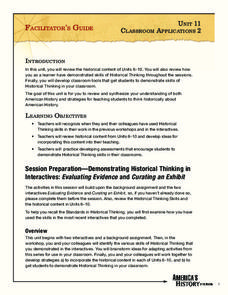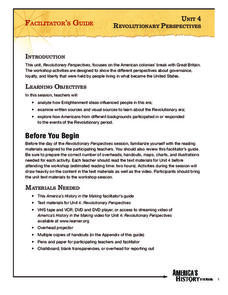Stanford University
Lesson Plan: Montgomery Bus Boycott
Most of us have heard of Rosa Parks, the Montgomery Bus Boycott, and Martin Luther King, Jr. But what about Claudette Colvin, Virginia Durr, Freedom Summer, or the Birmingham Children's Crusade? A five-lesson unit prompts class members...
PBS
Using Primary Sources: The Rogue's Gallery
What would be in your life's scrapbook? Scholars use short video clips, primary and secondary documents, and photos to investigate a 1909 scrapbook. They analyze and uncover what the Rogue Book tells them about the past in Western...
Administrative Office of the US Courts
Nomination Process
"I do solemnly swear that I will support and defend the Constitution of the United States..." Scholars investigate the nomination process of Supreme Court justices when assuming office. Through examination of primary and secondary...
Facing History and Ourselves
How Should We Remember?
We must remember the past in order to avoid its mistakes. Young historians analyze the importance of historical remembrance using primary and secondary documents, as well as video clips. They then study the creation of a World War II...
University of California
The Civil War: Emancipation
Investigate and analyze Abraham Lincoln's Emancipation Proclamation using primary and secondary sources. The sixth installment of an eight-part series analyzes the meaning of Lincoln's document in relation to its impact on the Civil War.
University of California
The Civil War: Final Assessment
Pupils discover the true nature and purpose of the Civil War in the eighth and final installment of an informative series. Using primary and secondary documents, history buffs merge social study knowledge with English skills to create a...
University of California
Decolonization
The ripple effect from one small event can impact many others. Young historians research the ripple effect World War II had on decolonization in the second installment of an eight-part series. Through primary and secondary documents as...
University of California
Principles vs. Practices
Have you ever wondered what your own World Order would look like? Scholars use primary and secondary documents as well as video clips to investigate and analyze the Cold War. Using the sources, the principles and practices of nations...
PBS
The Black Panthers
Stanley Nelson's acclaimed film, The Black Panthers: Vanguard of the Revolution uses interviews, archival footage, and images to document the story of the radical political party established in 1966 by Huey Newton and Bobby Seale. A...
PBS
Myth of the West: Lonely But Free I’ll Be Found
Tumbling tumbleweeds! Scholars work with video clips, primary and secondary documents, and song lyrics to uncover life in the Old West. They examine song's lyrics to uncover myths told in the 1930s about life in the Wild West.
Deliberating in a Democracy
Recycling
How often have you passed by a recycling container in your school? Scholars research the issue of recycling in the ever-changing global world. Using documentation and video evidence, they form their own opinions on recycling and how it...
PBS
George Washington Carver: Scientist, Inventor, and Teacher
Using video clips along with primary and secondary documents, scholars analyze the life of George Washington Carver, one of America's best scientists and inventors. Class members then create music, posters, and skits about this amazing...
University of California
The End of the Cold War (1979-1991)
Scholars use primary and secondary documents, as well as video evidence, to investigate the end of the Cold War. After completing the final installment of an eight-part series, class members better understand the issues surrounding the...
Annenberg Foundation
America's History in the Making: Classroom Applications Two
Reading between the lines helps discover important information! The 11th lesson of a 22-part series on American history has scholars use historical thinking skills to uncover the deeper meaning behind the words on a page. Using backward...
Center for Instruction, Technology, & Innovation
Did African American Lives Improve After Slavery?
The Civil War made slavery illegal, but all ex-slaves were not totally free. Scholars visit eight different classroom stations to uncover life during the Reconstruction Era in America. Groups discover items such as Black Codes, 13th,...
NET Foundation for Television
1850-1874 Native Americans and Settlers
Did Western settlers receiving free land from the Homestead Act realize it wasn't really free at all? Scholars investigate the impact Western expansion had on Native American culture in the mid-1800s. They use documents, timelines, and...
The Alamo
A Lesson in Citizenship
What does it mean to be an American citizen? Lieutenant Colonel Commander William Barret Travis believed that it meant honor to country first—even above one's own life. Middle and high schoolers read his final letters from the Alamo that...
Reading Through History
The Proclamation of 1763
The French and Indian War concluded with an important proclamation—that is, The Proclamation of 1763. Scholars read about the policies in the document and how the different sides of the French and Indian War reacted. Following, they...
Reading Through History
The Federalist Papers: Federalist Paper No. 10
James Madison, under the pen name “Publius,” justifies the need for an American Republic in Federalist Paper 10, which is perhaps one of the most influential contributions to the Federalist Papers. Readers examine his perspective with...
CCSS Math Activities
Smarter Balanced Sample Items: High School Math – Target O
Trigger an increased understanding of trigonometry. Young mathematicians answer a set of questions that require finding trigonometric ratios using similarity and solving real-world problems involving trigonometry. The questions all come...
New York State Education Department
US History and Government Examination: August 2015
Are your learners feeling a bit jittery about an upcoming American history standardized test? Take a look at a state standardized test to give them additional practice and ease their nerves. Extra practice includes a scaffolded...
PBS
Using Primary Sources: Wide Open Town
A picture speaks a thousand words, no matter how old! Scholars use political cartoons from the era of Prohibition and the Temperance Movement to analyze what, a primary document (in this case, a bootlegger's notebook) is telling them...
Annenberg Foundation
Revolutionary Perspectives
Life, liberty, and the pursuit of happiness. Learners go to the heart of the causes of the American Revolution. Examining political cartoons, Enlightenment documents, and firsthand accounts, they present their ideas and reflective...
Historic New Orleans Collection
Exploring Primary Sources: Music in New Orleans
Looking for a new and exciting way to teach young historians the art of primary source analysis? Jazz up your lesson plan with a resource that asks class members to analyze photos, travel documents, and letters written by some of New...
Other popular searches
- Historical Documents
- Oral History Documents
- Literature Circles Documents
- Teaching With Documents
- Founding Documents
- Word Processing Documents
- Html Documents
- Multimedia Documents
- Using Historical Documents
- Technical Documents
- Notable Historical Documents
- Workplace Documents

























